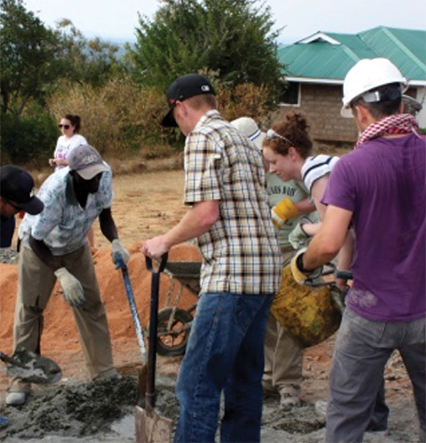Page Content
It was 31 degrees Celsius and the final day of the build. The fundi (Swahili for foreman) said there had not been a group as dedicated and as hard working as the teachers from Alberta. We had mixed and hauled more than 16 bags of cement to build pilings for a new classroom and completed over 100 feet of pathways for the Kisaruni Girls High School. Equally important, the eight teachers from Alberta built the foundation for a strong and enduring partnership with the teachers, students and educational facilitators in the Maasai Mara area of Kenya.
We arrived in Kenya to find that public school teachers were on strike for improved classroom conditions and equitable pay. Therefore, the teachers we were supposed to train wouldn’t be at the school. Nevertheless, many of the students attended Amori Joi School every day to meet with their classmates and prepare for state exams. We met with them, talked about their lives and played soccer together.

Life for children, especially females, isn’t easy in the Maasai Mara. A history of conflict and violence exists between the Kipsigi and Maasai tribes, and women are culturally subjugated by men. Although the daily lives of the mothers are difficult, the young girls we met will make big changes because of their education. The girls belong to a student support group and they know that each girl has unique strengths and talents that can further her learning.
We met with private school teachers at Kisaruni and observed them teaching in their classrooms. Teaching at Kisaruni is one of the most sought-after positions in Kenya, and many of the teachers at the school are at the top in their profession. In our discussions, we realized that this project would be a true partnership and we would all learn from each other.
During our next meeting with the educational facilitators and principals of Amori Joi Public School, it was evident that the needs of teachers, parents and students were much greater in the public system. Cement walls that were painted black served as chalkboards, and classrooms were equipped with old desks and tattered textbooks and paper—pencils, chalk and athletic supplies are badly needed. Despite these conditions, students have shown strength in English literacy and comprehension.
The personal and professional relationships we made, the children’s faces we saw and the experiences we shared will enrich our teaching practices and create global citizens who will improve the lives of all our students.
Michael Plouffe lives in Vegreville and taught at Delnorte School, in Innisfree, for Buffalo Trail Public Schools.
